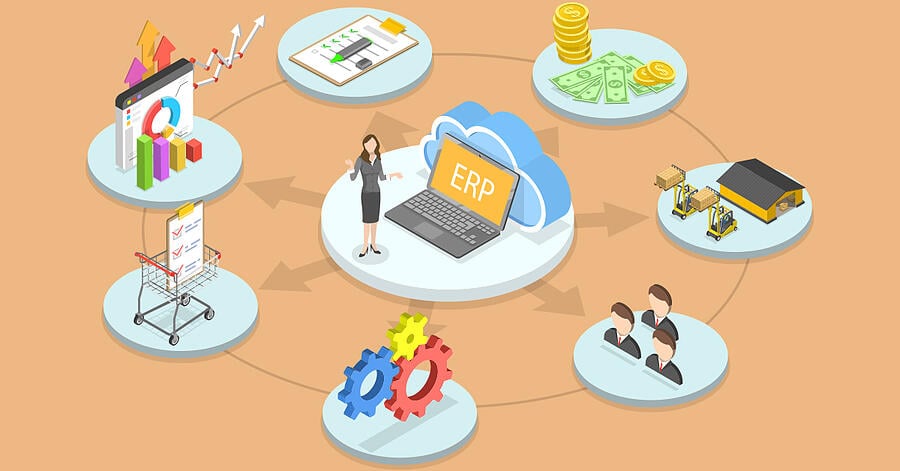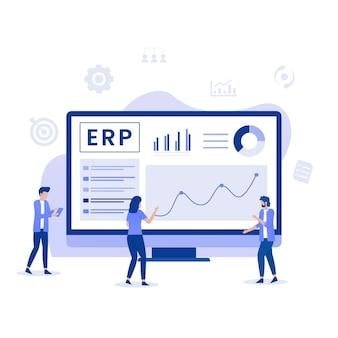What UX advancements take place in ERP business software?
In recent years, there have been numerous advancements in the field of user experience (UX) for ERP business software. These advancements have significantly improved the way businesses interact with and utilize their ERP systems, making them more efficient and user-friendly.
● Responsive Design
One of the major UX advancements in ERP business software, including ERP customization, is the adoption of responsive design. Responsive design ensures that the software is fully functional and easy to use on any device, whether it’s a desktop computer, tablet, or smartphone.
● ERP Examples with Great UX
Oracle NetSuite
Another example of an ERP business software with a strong UX is Oracle NetSuite. This software has adopted artificial intelligence (AI) and machine learning algorithms to improve the user experience. It can personalize the software based on user preferences and actions, and predict user needs to provide suggestions and recommendations. Oracle NetSuite also has a responsive design and intuitive interface, making it easy to use on any device and user-friendly for all users.
This allows businesses to access and manage their ERP systems, including NetSuite customization services, from anywhere, at any time. Here are some of the key UX advancements that have taken place in this area:
● Key UX Advancements
Personalization
One of the biggest advancements in ERP UX has been the ability for software to be personalized to meet the unique needs of individual users and organizations. This means that users can customize their interface and workflow to suit their specific roles and responsibilities, leading to increased efficiency and productivity.
● Mobile Optimization
With the proliferation of smartphones and tablets, it’s more important than ever for ERP b software to be optimized for mobile use. This means that users should be able to access and use all of the features of the software on their mobile devices, without sacrificing functionality or ease of use.
● Improved Navigation
In the past, ERP software could be confusing and difficult to navigate, with multiple levels of menus and submenus. However, recent UX advancements have focused on streamlining navigation, with clear and intuitive menus and the ability to access key features and functions with just a few clicks.
● Enhanced Visualization
One of the key ways that ERP business software can help users make better business decisions is through the use of data visualization. By presenting data in clear and visually appealing charts and graphs, users can quickly understand trends and patterns and make informed decisions.
● Collaboration Tools
Many ERP systems now include collaboration tools such as chat, file sharing, and task management, which allow teams to work together more effectively and efficiently. These tools help to improve communication and coordination, leading to better overall performance.
● Advanced Reporting
In the past, generating reports from ERP systems could be time-consuming and require specialized skills. However, modern ERP business software includes advanced reporting tools that allow users to easily create custom reports with just a few clicks. These reports can be shared with colleagues and stakeholders, helping to facilitate better decision-making.
● Integration with Other Systems
Another major UX advancement in ERP busines software is the ability to integrate with other systems and applications. This allows users to access and use data from multiple sources within a single interface, saving time and reducing the need to switch between different systems.

● Improved usability
Overall, the UX of ERP software has improved significantly in recent years, with more intuitive and user-friendly interfaces. This includes the use of responsive design, which ensures that the software is easy to use on any device, and the inclusion of helpful tips and tutorials to guide users through key tasks and functions.
● Customization options
Many modern ERP systems offer a range of customization options, allowing users to tailor the software to their specific needs and preferences. This includes the ability to create custom dashboards, modify user roles and permissions, and add or remove features as needed.
● Enhanced security
As businesses rely more and more on digital tools, the importance of cybersecurity cannot be overstated. ERP software has made significant advancements in this area, with improved security measures to protect against data breaches and unauthorized access.
Case study
One company that has made significant advancements in the user experience (UX) of their enterprise resource planning (ERP) software is SAP.
One example of this is their SAP Fiori interface, which allows users to access various SAP applications and tools through a single, intuitive interface. This interface is designed to be user-friendly, with a clear and consistent layout and easily accessible features.
Another UX advancement that SAP has implemented is the use of personalized dashboards. These dashboards allow users to customize the information and data they see, so they can easily access the specific tools and resources they need for their job.
Additionally, SAP has also focused on improving the usability of their ERP software through the use of smart assistants. These assistants use artificial intelligence to help users navigate the software and find the information they need more quickly and easily.
These UX advancements have helped SAP’s ERP software become more user-friendly and efficient for its users, improving the overall experience of using the software.
Overall, the UX of ERP business software has come a long way in recent years, with a range of advancements that help users work more efficiently, make better business decisions, and stay secure. As technology continues to evolve, it’s likely that we’ll see even more exciting developments in this field in the future.
